1-6单元重点单词,短语和句子keys
1到6单词和句子知识点
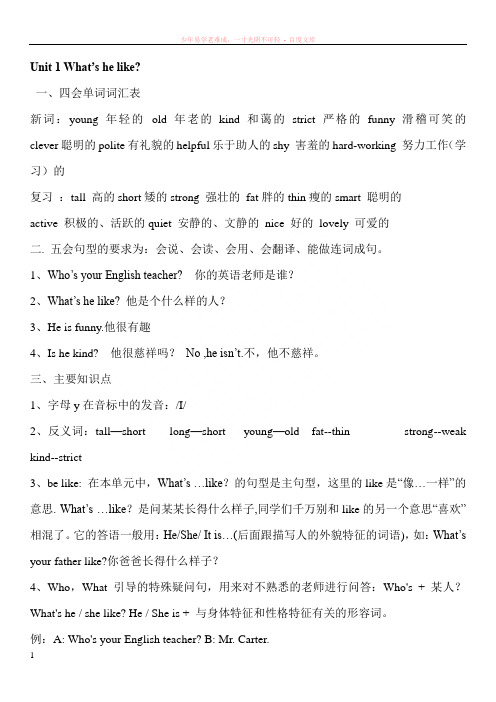
Unit 1 What’s he like?一、四会单词词汇表新词:young 年轻的old 年老的kind和蔼的strict 严格的funny滑稽可笑的clever聪明的polite有礼貌的helpful乐于助人的shy 害羞的hard-working 努力工作(学习)的复习:tall 高的short矮的strong 强壮的fat胖的thin瘦的smart 聪明的active 积极的、活跃的quiet 安静的、文静的nice 好的lovely 可爱的二. 五会句型的要求为:会说、会读、会用、会翻译、能做连词成句。
1、Who’s your English teacher? 你的英语老师是谁?2、What’s he like? 他是个什么样的人?3、He is funny.他很有趣4、Is he kind? 他很慈祥吗?No ,he isn’t.不,他不慈祥。
三、主要知识点1、字母y在音标中的发音:/I/2、反义词:tall—short long—short young—old fat--thin strong--weak kind--strict3、be like: 在本单元中,What’s …like?的句型是主句型,这里的like是“像…一样”的意思. What’s …like?是问某某长得什么样子,同学们千万别和like的另一个意思“喜欢”相混了。
它的答语一般用:He/She/ It is…(后面跟描写人的外貌特征的词语),如:What’s your father like?你爸爸长得什么样子?4、Who,What引导的特殊疑问句,用来对不熟悉的老师进行问答:Who's + 某人?What's he / she like? He / She is + 与身体特征和性格特征有关的形容词。
例:A: Who's your English teacher? B: Mr. Carter.A: What's he like? B: He's tall and strong.5.句型变换(1)She is kind .(变为疑问句)Is she kind ?(2)Mike is young .(对划线部分提问)What’s Mike like ?(3)I know .(变为否定句) I don’t kno w .6、Is引导的一般疑问句,谈论某位老师是否具有某方面的特征:Is he / she + 与身体特征和性格特征有关的形容词,回答用:Yes, he / she is. No, he / she isn't.例:Is she quiet? Yes, she is.7、Be动词的使用:我是am,你是are,is 连着他,她,它8.读一读Do you know Mr Young? 你知道Young先生吗?No, I don’t. 不,我不知道。
三年级英语上册M1—M6 重点短语
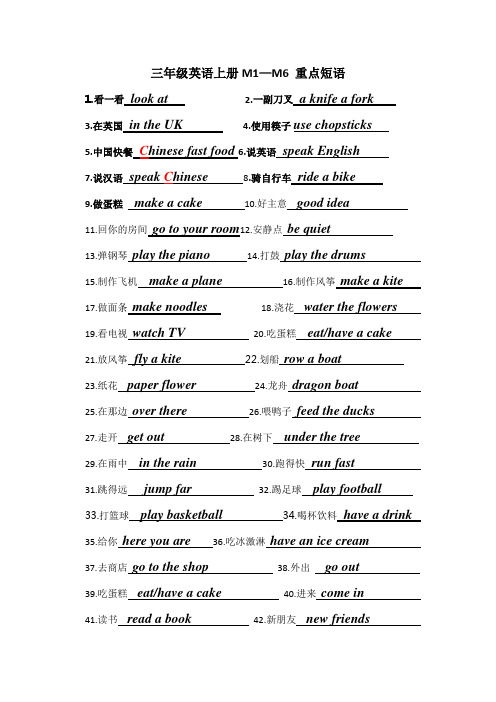
三年级英语上册M1—M6 重点短语1.看一看look at2.一副刀叉a knife a fork3.在英国in the UK4.使用筷子use chopsticks5.中国快餐C hinese fast food6.说英语speak English7.说汉语speak C hinese8.骑自行车ride a bike9.做蛋糕make a cake 10.好主意good idea11.回你的房间go to your room12.安静点be quiet13.弹钢琴play the piano 14.打鼓play the drums15.制作飞机make a plane 16.制作风筝make a kite 17.做面条make noodles 18.浇花water the flowers 19.看电视watch TV 20.吃蛋糕eat/have a cake 21.放风筝fly a kite 22.划船row a boat23.纸花paper flower 24.龙舟dragon boat25.在那边over there 26.喂鸭子feed the ducks27.走开get out 28.在树下under the tree29.在雨中in the rain 30.跑得快run fast31.跳得远jump far 32.踢足球play football 33.打篮球play basketball 34.喝杯饮料have a drink 35.给你here you are 36.吃冰激淋have an ice cream37.去商店go to the shop 38.外出go out39.吃蛋糕eat/have a cake 40.进来come in41.读书read a book 42.新朋友new friends43.和...一起玩play with44.小心点be careful45.别担心don’t worry 46.洗脸wash my faceM6 重点短语整理1.a new friend 新朋友2.have got(单三)has got 有3.new shorts 新短裤4.new shoes 新鞋子5.a new dress一条新裙子6.a new shirt一件新衬衫7.play with跟......一起玩8.don’t worry别担心9.wash my face洗脸10.wash my hair 洗头发11.wash my clothes 洗衣服12.wash the dishes洗碗a new football 新足球14.be careful 小心点M7 重点短语整理1.have got a headache 头疼2.have got a stomach ache胃疼4.have got a test 考试 5.have got a cold 感冒6.have got a cough咳嗽7.on Friday在星期五8.on Fridays 每周五9.a clever boy一个聪明的男孩子M9重点短语整理make friends 交朋友do the high jump 参加跳高do the long jump 参加跳远run a race 跑步M10重点短语整理at the airport 在飞机场go to Hong Kong 去香港ride a bike 骑自行车read a book 骑自行车visit my friends 探望我的朋友see a film 看电影have a class上课in the class 在课堂上。
1到6单元知识点总结
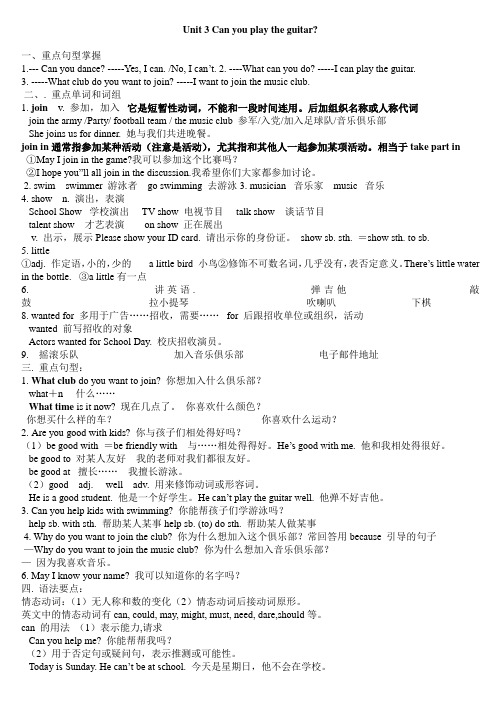
Unit 3 Can you play the guitar?一、重点句型掌握1.--- Can you dance? -----Yes, I can. /No, I can’t.2. ----What can you do? -----I can play the guitar.3. -----What club do you want to join? -----I want to join the music club.二、. 重点单词和词组1. join v. 参加,加入它是短暂性动词,不能和一段时间连用。
后加组织名称或人称代词join the army /Party/ football team / the music club 参军/入党/加入足球队/音乐俱乐部She joins us for dinner. 她与我们共进晚餐。
join in通常指参加某种活动(注意是活动),尤其指和其他人一起参加某项活动。
相当于take part in①May I join in the game?我可以参加这个比赛吗?②I hope you‖ll all join in the discussion.我希望你们大家都参加讨论。
2. swim swimmer 游泳者go swimming 去游泳3. musician 音乐家music 音乐4. show n. 演出,表演School Show 学校演出TV show 电视节目talk show 谈话节目talent show 才艺表演on show 正在展出v. 出示,展示Please show your ID card. 请出示你的身份证。
show sb. sth. =show sth. to sb.5. little①adj. 作定语,小的,少的 a little bird 小鸟②修饰不可数名词,几乎没有,表否定意义。
There’s little water in the bottle. ③a little 有一点6. ______________________ 讲英语. _____________________弹吉他 ______________________ 敲鼓 ______________________ 拉小提琴______________________ 吹喇叭 _____________ 下棋8. wanted for 多用于广告……招收,需要……for 后跟招收单位或组织,活动wanted 前写招收的对象Actors wanted for School Day. 校庆招收演员。
英语1-6单元复习重点单词句型

Unit 1 My classroom(我的教室)词汇:(1)classroom教室window窗户 blackboard 黑板 light 电灯 picture 图画 door 门teacher’s desk 讲台computer 计算机 fan电扇 wall 墙 floor 地板(2) really 真的 near 距离近 TV 电视 clean 打扫 help 帮助词组、短语;open the door 开门 turn on the light 开灯 close the window 关窗子 put up the picture 张贴图画 clean the blackboard 擦黑板clean the window 擦窗子 clean the door 擦门 clean the classroom 打扫教室句型:1、We have a new classroom, 我们有一间新的教室。
2、It’s so big. 它很大3、What’s in the classroom ? 教室里面有什么?4、One blackboard、one TV、many desks and chairs. 有一块黑板、一台电视、许多的课桌和椅子。
5、Let’s clean the classroom .让我们一起打扫教室吧。
6、Let me clean the teacher’s desk.。
让我来擦讲桌。
7、 Where is it?它在哪里?8、It’s near the window.它在窗子的附近。
9、It’s in the desk. 它在桌子里面。
10、It’s on the teacher’s desk. 它在讲桌上。
Unit 2 My schoolbag(我的书包)词汇:schoolbag书包 maths book 数学书 English book英语书 toy 玩具 Chinese book 语文书 storybook故事书 candy 糖果 notebook笔记本 key 钥匙 lost 丢失cute 可爱的so much非常句型:1、What’s in your schoolbag?你的书包里有什么?2、An English book、a Chinese book、a maths book and three storybooks. 有一本英语书、一本语文书、一本数学书和三本故事书。
九年级1-6单元短语英语

九年级1-6单元短语英语新目标九年级英语Unit 1重点知识一、重点词组:1.by making flashcards 通过做单词抽认卡2. ask…for help 向某人求助3.read aloud 朗读4.that way (=in that way) 通过那种方式5.improve my speaking skills提高我的会话技巧6.for example (=for instance)例如7.have fun 玩得高兴8.have conversations with friends与朋友对话9.get excited 高兴,激动10.end up speaking in Chinese以说汉语结束对话11.do a survey about…做有关…的调查12.keep an English notebook 记英语笔记13.spoken English (= oral English) 英语口语14.make mistakes 犯错误15.get the pronunciation right 使发音准确16.practise speaking English 练习说英语17.first of all 首先18.begin with 以…开始/doc/ab374213.html,ter on 随后20.in class在课堂上/doc/ab374213.html,ught at 嘲笑22.take notes 记笔记23.enjoy doing 喜欢干…24.write down 写下,记下25.look up (v + adv) 查找,查询26.native speakers 说本族话的人27.make up 编造,虚构,化妆,打扮28.around the world 全世界29.deal with 对待,处理,解决30.worry about (be worried about) 担心,担忧31.be angry with 生某人的气32.stay angry 生气33.go by 消逝34. regard…as…把…当做…/doc/ab374213.html,plain about/of 抱怨36. change…into…把…变成…(= turn into)37.with the help of 在…的帮助下38. compare…to (with)…把…和…作比较39.think of (think about) 想起,想到40.physical problems身体上的问题41.break off 中断,突然终止42. not…at all 根本不,全然不二、重点句子:1. How do you study for a test? 你怎样为考试做准备?2. I have learned a lot that way. 用那种方法,我已经学到了很多东西。
Unit1-6 单词-短语-句子
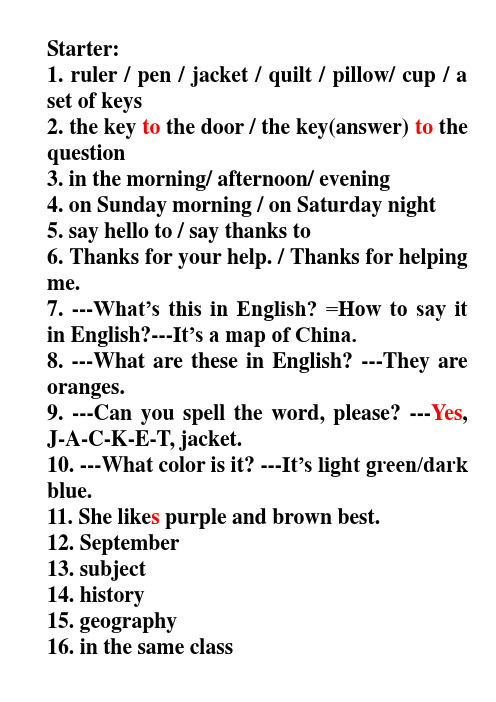
Starter:1. ruler / pen / jacket / quilt / pillow/ cup / a set of keys2. the key to the door / the key(answer) to the question3. in the morning/ afternoon/ evening4. on Sunday morning / on Saturday night5. say hello to / say thanks to6. Thanks for your help. / Thanks for helping me.7. ---What’s this in English? =How to say it in English?---It’s a map of China.8. ---What are these in English? ---They are oranges.9. ---Can you spell the word, please? ---Yes, J-A-C-K-E-T, jacket.10. ---What color is it? ---It’s light green/dark blue.11. She like s purple and brown best.12. September13. subject14. history15. geography16. in the same class17. I want to do well in my new school and I believe I can.18. speak English19. an English girl20. an orange / apple21. half an hour22. a map of China23. a cup of tea24. a piece of paperUnit1:1. zero/ one / two/ three/ four/ five / six/ seven/ eight / nine / ten2. play basketball3. a map of China4. a pair of glasses5. three pairs of friends6. phone number/ telephone number7. first name=given name 名8. last name=family name 姓9. full name 全名10. an ID card11. be late for school12. a football match between A and B13. in black / in white 穿黑色/白色衣服14. Friends must be friendly.15. It’s nice to have a friend like you.16. His family is a big family. (家庭)17. His family are all watching TV at home now. (家人)18. There are ten families in this building. (家庭)19. Gina is good at English.20. Nick is good at playing the piano.Unit 2:1. grandfather / grandpa2. grandmother / grandma3. grandparents / parents4. brother / sister5. uncle/ aunt / cousin6. son / daughter (doctor)7. wife / husband8. friend / friendly9. this / these // that / those10. Picture 1 // Picture One11. Class 9/10, Grade 7 // Class Nine/ Ten, Grade Seven12. in the first photo13. in the next picture14. two photo s of my family= two family photo s15. family tree16. the name of my dog= my dog’s name17. a boy’s name / a girl’s name18. ---Who’s he? --- He is my father.19. ---Have a good day! ---Thanks. You, too.20. These three girls are my sisters and my cousin.21. In the next picture are my two brothers and their friends.22. ---Are these your toy cars ? ---Are these toy cars yours?---No, they aren’t. I think they are hers. Unit 3:1. school things2. a pencil box3. an eraser4. schoolbag/ backpack5. an English-Chinese dictionary6. two dictionaries7. computer game8. play baseball9. two nice watches10. watch TV/ watch a game11. school ID card12. in the school library13. notebook14. in the lost and found case15. mine/ hers/ his/ yours/ ours/ theirs16. ---Thanks for your help./ Thanks for helping me.---You’re welcome. / Not at all. / That’s OK. /That’s all right. / It’s my pleasure.17. What about/ How about doing sth/ n. / pron.?18. ask ab for sthask your teacher for helpask your parents for money19. call sb at 555-2345 / e-mail sb at …20. Here is a set of keys.Here are some keys.21. This set of books is theirs.22. He must find it.23. fifteen photo s24. nineteen tomato esUnit 4:1. behind the table2. under the chair3. on the bed4. stay in bed/ be ill in bed5. on the sofa6. in your grandparents’ room7. on your head8. over the river9. in a hat10. in a white shirt11. watch news on TV12. tape player13. radio14. clock15. model plane/car16. keep tidy/ keep our classroom clean and tidy17. next to the tape18. between the dresser and the bookcase 在梳妆台和书柜之间19. fourteen women teachers 14个女教师20. forty-four boy students 44 个男学生21. take sth to sb. /s.p 把…拿给某人/ 到某处22. take sth. there/ home 把…拿到家/那儿23. take sb. to school 送某人上学24. bring sth. to sb. / s.p 把…带来给某人/ 到某处25. bring sth.here 把…带到这儿26. bring sth to school 把…带到学校来27. need sth. 需要某物28. need to do sth. 需要做某事29. on / in the wall 在墙上30. in / on the tree 在树上31. He often learn s English on the radio.32. He always play s basketball after school.33. The bookcase is in the front of our classroom.34. There is an apple tree in front of our classroom and there are many apples on the tree.35. There is a football match between No.1 Middle School and No.2 Middle School.36. ---Where are the blackboard and theclock? ---They are on the wall.37. My dictionary is in my schoolbag and my schoolbag is on the teacher’s desk.Unit 5:1. tennis ball / racket2. ping-pong ball / bat3. two soccer ball s4. three baseball bat s5. play volleyball/ basketball6. let sb do sth7. be late for class/school8. an interesting story9. a boring job10. a fun party11. have fun do ing12. have fun/ have a good time/ enjoy oneself13. a difficult problem14. a relaxing song15. watch TVwatch news/sports on TV //watch a volleyball game on TV16. listen to music on the Internet 在网上听音乐17. talk on the phone 讲电话18. join a sports club 加入一个体育俱乐部19. do sports / play sports20. every day 每一天21. Let me get my jacket and hat.22. ---Let’s see a film on Sunday morning, OK?---That sounds fun/ great.23. He doesn’t like playing volleyball or playing the violin.24. He is late for school today, but I am not.25. He often plays ping-pong with his classmate after class, but I don't.26. It’s easy for us to learn English well.27. It’s difficult for him to learn math well.28. I want to help you with your English.I want to help you (to) learn English.29. He is interested in learning English because he thinks it's interest ing.Unit 6:1.t wo hamburgers2.t hree tomatoes3.s ome carrots4.s ome strawberries5.a n ice-cream/ egg/ apple6.f ruit salad / vegetable salad7.b irthday dinner8.t hink about the food and the drink9.L et’s think about playing ping-pong afterschool.10. a bag of rice11. a bowl of rice12.two glasses of milk13.some pieces of bread14.He wants to drink/ have some orange.15.Bill likes fruit, but he does n’t likevegetables.16.He likes eating chicken and French friesfor lunch.17.It’s important to eat an apple every day.18.ask sb about sthask sb for sthask sb to do sth19.He often asks me about our school.You can ask the police for help.Miss Zhan asks us to read an English text every day.20.His parents want him to eat/have lunchat school.21.His eating habits are good because hedoesn’t want to be fat.22.Having breakfast on time is good for ourhealth.It’s healthy for us to have breakfast ontime.23.I don’t think potato chips are healthyfood.24.Sports star eats well every day.25.We should do our homework carefully.。
人教版九年级英语unit1--6短语总结

Unit 11 向老师寻求帮助___________ 2提高说的技能_______________3听录音____________ 4具体的建议_______________ 5结束告终____________ 6 做一个调查________________7学习语言的最好方法___________________8使发音正确___________ 9写作练习_________ 10开始______________11首先________________ 12决定干某事_____________ 13做某事有困难_______________ 14犯错误_____________ 15 以后____________ 16害怕做某事__________17嘲笑___________18做笔记_____________ 19处理、对付____________ 20生某人的气____________21 因……而生气_______________22尽某人最大努力_______________Unit21对……感兴趣___________________ 2 在游泳队里___________________3 对……极度恐惧______________4 开着卧室的灯入睡_________________5 一直_______________6 花费时间干某事_______________7 不再_________________8 和……聊天__________9 在过去的几年里____________ 10 一个十五岁的男孩____________________11 负担……的费用_________________ 12 尽可能好的___________________13 做出一个艰难的决定______________________14 对……有耐心_______________ 15 令某人惊奇的是____________________ 16 尽管即使________17 对……感到骄傲_____________18 对……留心______________ 19 放弃干某事____________ 20 怀念过去的日子____________21 以前做某事__________Unit31打耳洞______________2代替而不是_______________ 3全神贯注,专心于______________4挡道的,妨碍人的___________________5担心关心___________6对某人要求严格_________ 7对某事要求严格_________________8考试失败_______________9清扫整理_____________ 10允许某人干某事_________________11有机会干某事________________ 12休息两天__________ 13实现我的梦想______________14 对……是认真的________________ 15花费时间干某事____________________16 花费时间在某17事上__________18前不久,几天前___________19 8个小时的睡眠__________ 20考试失败____________ 21走10分钟的路程_____________ Unit41两百万___________ 2医学研究__________3如果……那么会怎样_____________ 4未经允许_____________5 和……相处_________ 6宁可而不是__________7 宁愿做某事而不愿做某事___________________ 8邀请某人干某事_______________ 9打扰影响某人____________ 10 做演讲_____________11 处理应付___________ 12出版,发表___________ 13使……失望__________14 提出想出__________ 15查明__________ 16提供给某人某物_____________ 17主动干某事________ 18拒绝干某事_____________Unit51 组成,构成____________2为……而担忧_______________ 3赶车______________ 4从……逃走______________ 5太多的作业_____________ 6假装干某事___________ 7用光用完___________8 渴望做某事_________________9被采访_______________10 有……在进行______________当心小心_____________Unit6 1使某人想起、回忆起___________ 2 这些年来____________ 3 一定干某事_________ 4展览___________ 5一位世界级的摄影师_______________________ 6错过展览___________ 7顾名思义_________8使我们高兴_______ 9使我感到恶心__________________ 10正好适合我___________ 11六个月的英语课程____________ 12期待干某事_____________13 期待某人干某事_____________ 14老实说,说实在的_______ 15远离、与……保持距离__________ 16照顾__________17意见一致__________ 18增加癌症的风险______________19介意干某事____________ 20 比起……来更喜欢……________21比起干某事来更喜欢干某事__________________ 21 更喜欢干某事_________ 22 宁愿干某事而不愿做某事____________23 无论你做什么____________24看见某人做了某事___________25看见某人正在干某事___________。
1-6单元重点短语

Unit 6 重点词汇
看电视 watch TV
看报纸 read a newspaper read newspapers
通过电话交谈 talk on the phone
听 listen to (music…)
使用电脑 use the computer
做汤 make soup
Unit 3重点短语
坐火车 take the train=go to…by train
坐公车 take the bus=go to…by bus
坐地铁 take the subway= go to…by subway
骑自行车 ride one’s bike= go to…by bike
走路 walk=go to…on foot
起床 get up
七点一刻 at 7:15/at a quarter past seven
上学 go to school
差一刻七点 at a quarter to seven
穿好衣服 get dressed
打扫房间 clean the room
刷牙 brush teeth
散步 take a walk
洗餐具 wash the dishes do the dishes
有点儿 kind of+adj
希望做某事 wish/hope to do sth
其他任何一个 any other+单数名词
为考试而复习 study for the test
端午节 Dragon Boat Festival
寄宿家庭 host family
遵守规则 follow the rules
找吃的 get food
Units 1―6单元词汇短语句型归纳

The Second PeriodⅠ. Teaching Aims and Demands1. Knowledge Objects(1)Key Vocabulary gently(2)Relative Clasue with who2. Ability Objects(1)Train the students’ listening skill.(2) Train the students to use relative clause with who.(3)Train the students to make communications, usingA: Does Xu Fei like the Moderns?B: No, he doesn’t. He prefers…3. Moral ObjectThank the musicians who make our world more wonderful.Ⅱ. Teaching Key Points1. The students’ listening skill.2. The relative clause with that and who.3. Make communications with the question in Activity 2c.Ⅲ. Teaching Difficult Points1.Train the students’ listening skill2.Make communications using "Does Xu Fei like the Moderns? No, he doesn’t. He prefers…Ⅳ. Teaching Methods1. Listen and do the exercises2. PairworkⅤ. Teaching AidA tape recorderⅥ. Teaching ProceduresStep ⅠRevision(1) Revise the relative clause with that by asking what kind of music do you like? Help them to answer, I like music that… I love music that… I prefer music that…(2)Check the homework by asking some students to share their sentences with the class.Step Ⅱ2aThis activity provides listening practice using the target language.Read the instructions to the students and make sure that they know what to do. Go over the four items in the box with the children. Tell them that relative clause with who is used to introduce a person.Give another sample, Amy likes teachers who work hard. Help the students to make some more similar ones.Explain the new key word gentle to the students. Tell them gentle means quiet, careful, not rough or violent using Chinese if necessary.Tell the children that we are going to hear a boy and a girl talking about the music and musicians they like. Play the recording. Students only listen the first time. Play the tape again. Ask the students to circle T for true and F for false. Check the answers.Answers1. T2. F3. T4. TTapescriptBoy: Look, Carmen. These T-shirts are great! Look at this one.Girl: That’s a great shirt, Xu Fei. I really love Dan Derrish. I like musicians who play different kinds of music.Boy: Hmmm…he’s okay…Girl: He’s only okay? You must be joking.Boy: Well…I like musicians who write their own songs. Dan Derrish doesn’t write his own music.Girl: Hmm. Well, I think he’s great.Boy: The Moderns T-shirt is very interesting.Girl: The Moderns are really great. I love music that’s really loud and energetic. Boy: I know you do…but I prefer groups that play quiet and gentle songs.Step Ⅲ2bThis activity provides listening practise using the target language.Read the instructions to the students first. Then let them have a look at the chart. Read the model sentence to them.Say, We will hear the same recording again. Listen carefully, and find out what Carmen and Xu Fei say and complete the sentences in the chart. Play the recording again. Pause the tape if necessary.Check the answers.AnswersXu Fei:1. I prefer groups that play quiet and gentle songs.3. I like musicians who write their own songs.Carmen:2. I love music that’s really loud and energetic.4. I like musicians who play different kinds of music.Step Ⅳ2cThis activity provides guided oral practise using the target language.Get two students to read the conversation in the box to the class.S A: Does Xu Fei like the Moderns?S B: No, he doesn’t. He prefers…Read the instructions to the class, and ask another pair to ask and answer, using the information from Activities 2a and 2b to make sure all the students know what to do.Tell them each pair of them should make a conversation using information from Activities 2a and 2b. Ask them to work in pairs. Move around the classroom checking the progress of the pairs and offering help as needed. Ask one or two pairs to say their conversations to the class.Step ⅤGrammar FocusWrite the three sentences on the blackboard first. Circle the words that and who and underline the relative clauses in all the three sentences.Ask, What do the relative clauses with that describe--a person or a thing? Help the student to say out the right answer.Then ask the same question on the relative clauses with who.Explain that the relative clauses with that describe things and the relative clauses with who are used to describe persons.Tell them who is for people and that is for things.Ask the students to make up more similar sentences.Encourage them to ask questions about relative clause.Step ⅥSummarySay, In this class we’ve done some listening practice on the target language of this unit. We met some more sentences with relative clause, and we did some pairwork on asking questions with does and answering with sentences with relative clause.Step ⅦHomework(1) Ask the students to write two sentences with relative clause with who.(2) Ask the students to write out a conversation they practised in Activity 2c. Step ⅧBlackboard Design。
九年级英语上M1-6重点单词、词组和句子
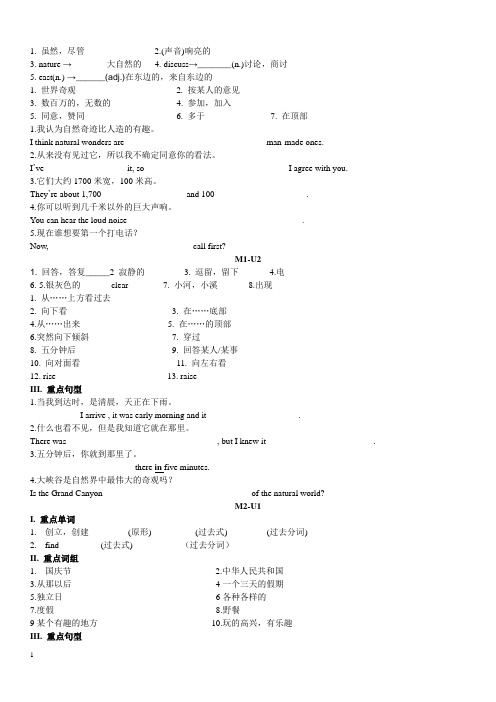
1. 虽然,尽管________2.(声音)响亮的________3. nature →________大自然的4. discuss→_______(n.)讨论,商讨5. east(n.)→______(adj.)在东边的,来自东边的1. 世界奇观_______________2. 按某人的意见_______________3. 数百万的,无数的_____________4. 参加,加入_______________5. 同意,赞同_______________6. 多于_______________7. 在顶部_______________1.我认为自然奇迹比人造的有趣。
I think natural wonders are___________ __________ __________ man-made ones.2.从来没有见过它,所以我不确定同意你的看法。
I’ve _________ _________it, so ___________ _________ ___________ I agree with you.3.它们大约1700米宽,100米高。
They’re about 1,700 _________ _________ and 100 __________ __________.4.你可以听到几千米以外的巨大声响。
You can hear the loud noise ________ _________ ___________ __________.5.现在谁想要第一个打电话?Now, __________ ___________ __________ call first?M1-U21. 回答,答复_____2 寂静的_______ 3. 逗留,留下_______4.电_______6.5.银灰色的_______clear _______7. 小河,小溪_______8.出现_____1. 从……上方看过去_______________2. 向下看_______________3. 在……底部_______________4.从……出来_______________5. 在……的顶部_______________6.突然向下倾斜_______________7. 穿过_______________8. 五分钟后_______________ 9. 回答某人/某事_______________10. 向对面看_______________ 11. 向左右看_______________12. rise ______ ______ ______ 13. raise ______ ______ ______III. 重点句型1.当我到达时,是清晨,天正在下雨。
三年级下册英语重点句子1~6单元

三年级下册英语重点句子1~6单元Unit 11. Where is my backpack? It’s on the chair.2. Can you see it? No, I can’t.3. Where is the kite? It’s under the tree.4. Can you see it? Yes, I can.5. I can see a rainbow in the sky.Unit 21. How many birds can you see? I can see six.2. How many pandas can you see? I can see three.3. How many monkeys can you see? I can see five.4. How many turtles can you see? I can see two.5. How many rabbits can you see? I can see four. Unit 31. Can you swim? Yes, I can.2. Can you ride a bike? No, I can’t.3. Can you fly a kite? Yes, I can.4. Can you play the guitar? No, I can’t.5. Can you climb trees? Yes, I can.Unit 41. What do you like to do on the weekend? I like to play with my friends.2. What does she like to do in the park? She likes to ride a bike.3. What does he like to eat for breakfast? He likes to eat cereal.4. What do they like to drink? They like to drink orange juice.5. What does the dog like to chase? The dog likes to chase the ball.Unit 51. What’s the weather like today? It’s sunny.2. What’s the weather like in spring? It’s warm.3. What’s the weather like in summer? It’s hot.4. What’s the weather like in autumn? It’s cool.5. What’s the weather like in winter? It’s cold.Unit 61. What do you need? I need some markers.2. What does she need? She needs a pencil case.3. What does he need for PE class? He needs a T-shirt and shorts.4. What do they need for the party? They need snacks and drinks.5. What does the teacher need for the lesson? The teacher needs a whiteboard and markers.These are the key sentences from Unit 1 to Unit 6 in the third-grade English textbook. It is important for students to practice these sentences in order to improve their English language skills. Each unit covers different topics and vocabulary, helping students to expand their knowledge and understanding of the English language.。
1-6单元重要短语、句型 背就对了!
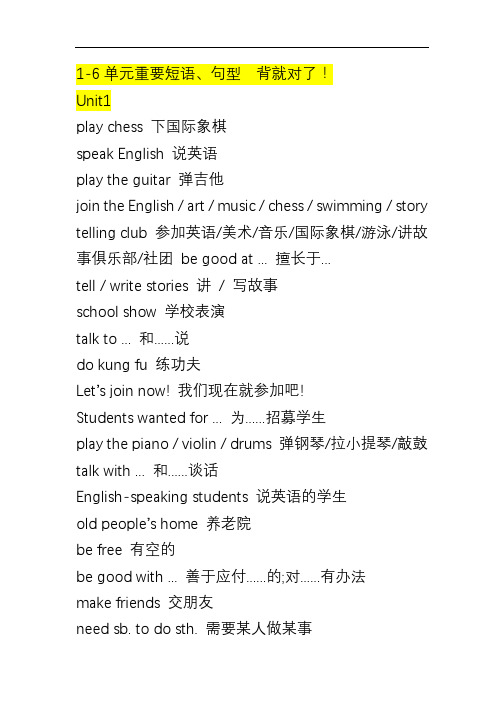
1-6单元重要短语、句型背就对了!Unit1play chess 下国际象棋speak English 说英语play the guitar 弹吉他join the English / art / music / chess / swimming / story telling club 参加英语/美术/音乐/国际象棋/游泳/讲故事俱乐部/社团be good at ... 擅长于...tell / write stories 讲/ 写故事school show 学校表演talk to ... 和......说do kung fu 练功夫Let’s join now! 我们现在就参加吧!Students wanted for ... 为......招募学生play the piano / violin / drums 弹钢琴/拉小提琴/敲鼓talk with ... 和......谈话English-speaking students 说英语的学生old people’s home 养老院be free 有空的be good with ... 善于应付......的;对......有办法make friends 交朋友need sb. to do sth. 需要某人做某事help (sb.) with sth. 在某方面帮助(某人) on the weekend 在周末music festival 音乐节Unit2get up 起床;站起brush one’s teeth 刷牙get dressed 穿上衣服have / eat breakfast 吃早餐take a shower 洗淋浴radio station / show 广播电台/ 节目at night 晚上go to work 去上班be late for work 上班迟到on weekends (在)周末best friend 最好的朋友do (one’s) homework 做作业clean one’s room 打扫房间take a walk 散步;走一走go home 回家get home 到家lots of 大量;许多go to bed 上床睡觉either ... or ... 要么......要么......;或者......或者......;be good for ... 对......有好处taste good 尝起来不错make breakfast 做早餐Unit3get to 到达take the train / bus / subway / boat 乘火车/公共汽车/地铁/船by train / bus / subway / boat乘火车/公共汽车/地铁/船ride a bike / by bike 骑自行车It takes sb. some time to do sth. 做某事花费某人多长时间。
unit 1-6知识点、短语
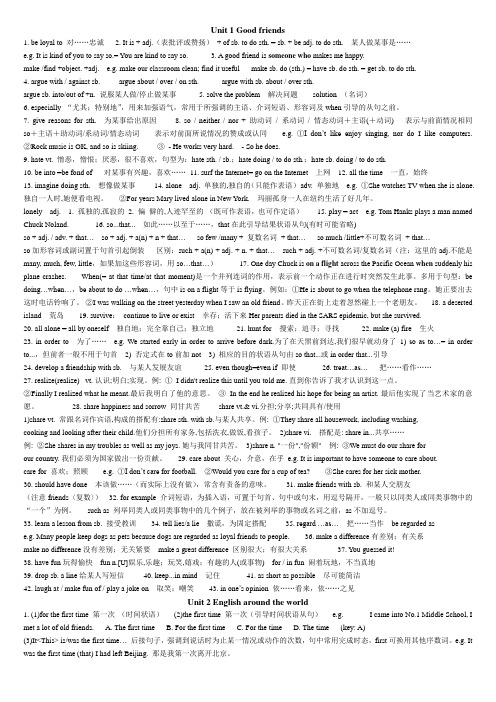
Unit 1 Good friends1. be loyal to 对……忠诚2. It is + adj.(表批评或赞扬)+ of sb. to do sth. = sb. + be adj. to do sth. 某人做某事是……e.g. It is kind of you to say so.= You are kind to say so. 3. A good friend is someone who makes me happy.make /find +object. +adj. e.g. make our classroom clean; find it useful make sb. do (sth.) = have sb. do sth. = get sb. to do sth.4. argue with / against sb. argue about / over / on sth. argue with sb. about / over sth.argue sb. into/out of +n. 说服某人做/停止做某事 5. solve the problem 解决问题solution (名词)6. especially “尤其;特别地”,用来加强语气,常用于所强调的主语、介词短语、形容词及when引导的从句之前。
7. give reasons for sth. 为某事给出原因8. so / neither / nor + 助动词/ 系动词/ 情态动词+主语(+动词) 表示与前面情况相同so+主语+助动词/系动词/情态动词表示对前面所说情况的赞成或认同 e.g. ①I don’t like enjoy singing, nor d o I like computers.②Rock music is OK, and so is skiing. ③- He works very hard. - So he does.9. hate vt. 憎恶,憎恨;厌恶,很不喜欢,句型为:hate sth. / sb.;hate doing / to do sth.;hate sb. doing / to do sth.10. be into =be fond of 对某事有兴趣,喜欢……11. surf the Internet= go on the Internet 上网12. all the time 一直,始终13. imagine doing sth. 想像做某事14. alone adj. 单独的,独自的(只能作表语)adv. 单独地 e.g. ①She watches TV when she is alone. 独自一人时,她便看电视。
3A 1--6 单元重点单词和句型
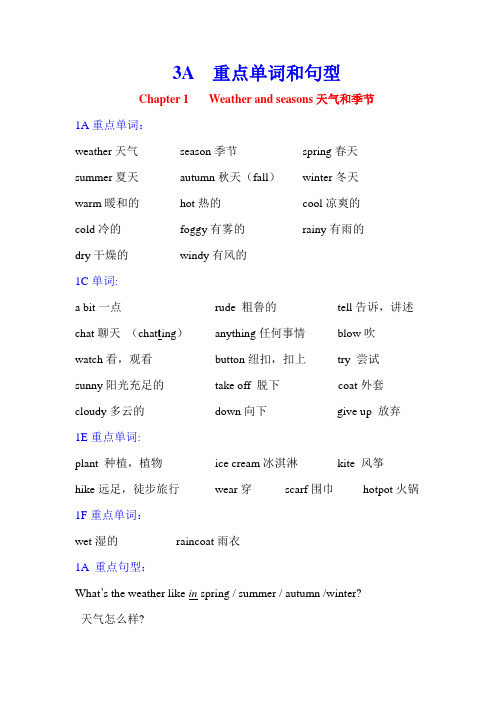
3A 重点单词和句型Chapter 1 Weather and seasons天气和季节1A重点单词:weather天气season季节s pring春天summer夏天autumn秋天(fall)winter冬天warm暖和的hot热的cool凉爽的cold冷的foggy有雾的rainy有雨的dry干燥的windy有风的1C单词:a bit一点rude 粗鲁的tell告诉,讲述chat聊天(chat t ing)anything任何事情blow吹watch看,观看button纽扣,扣上 try 尝试sunny阳光充足的take off 脱下coat外套cloudy多云的down向下give up 放弃1E重点单词:plant 种植,植物ice cream冰淇淋kite 风筝hike远足,徒步旅行wear穿scarf围巾hotpot火锅1F重点单词:wet湿的raincoat雨衣1A 重点句型:What’s the weather like in spring / summer / autumn /winter?天气怎么样?It's warm and foggy(spring).(春天)天气暖和多雾。
It’s hot and rainy(summer).(夏天)天气热而且多雨。
It’s cool and dry(autumn).(秋天)凉爽而干燥。
It's cold and windy(winter).(冬天)寒冷而风大.1C句型:1.You are a bit rude。
你有一点没礼貌。
2.We don’t want to play with you。
我们不想和你玩。
3.Why don’t they want to play with me. 他们为什么不想跟我玩呢?4.I am strong。
I can do anything. 我很强壮,我能做任何事情.5.Can you see the man and the little girl down there?你能看见下面那个男人和那个小孩吗?6.Miss Sun smiles warmly at the people。
初三1--6单元的单词和短语

Unit1 单词和短语单词:1. 教科书,课本-----2. 交谈,谈话----3. 大声地,出生地----4. 发音,读音(名词)------5. 句子----6. 有耐心的,病人----7. 表情,表示,表达方式---- 8. 发现,发觉-----9. 秘密,秘诀---- 10. 秘密,秘诀---- 11. 语法----12. 重复,重做---- 13. 笔记,记录----- 14. 朋友,伙伴---15. 物理,物理学----- 16. 化学---- 17. 记忆,记住----18. 模式,方式---- 19.发音(动词)---- 20.增加,增加----21. 速度------ 22. 搭档,同伴----- 23. 天生的-----22. 能力,才能------ 23. 创造,创建----- 24. 大脑----25. 活跃的,积极的----- 26. 注意,关注----- 27. 使…连接,与….有联系--- 28. 一夜之间,在夜间---- 29. 回顾,复习---- 30. 知识,学问----31. 终身的,毕生的---- 32. 明智地,聪明地-----短语:33. 查阅,抬头看----- 34. 天生具有------ 35. 注意,关注----36. 把……和…….连接或联系起来-----Unit2 单词和短语单词:1. 月饼---2. 灯笼-----3. 陌生人----4. 亲属,亲戚---5. 磅,英镑-----6. 民间的,民俗的---7. 女神----8. 无论谁,不管什么人---- 9. 偷,窃取----10. 放置,安放,产卵,下蛋----- 11. 甜点,甜食---12. 花园,园子---- 13. 传统---- 14. 欣赏,仰慕---15. 领带,捆,束---- 16. 有鬼混出没的,闹鬼的----17. 鬼,鬼魂--- 18. 花招,把戏---- 19. 款待,招待--- 20. 蜘蛛---- 21. 圣诞节---- 22. 存在,平躺,处于---- 23. 小说---- 24. 前夕,前夜---- 25. 死的,失去生命的--- 26. 生意,商业---- 27. 处罚,惩罚---- 28. 警告,告诫--- 29. 现在,礼物----- 30. 温暖,暖和---- 31. 传播,展开--- 32. 澳门---- 33. 清迈-----短语:34. 泼水节----- 35. 中秋节----- 36.母亲节---- 37. 父亲节---- 38. 万圣节前夕-----39. 复活节----- 40. 圣诞老人----- 41. 增加,发胖—42. 摆开,布置--- 43. 最终成为,最后处于------Unit 3 单词和短语单词:1. 洗手间,公共厕所----2. 邮票,印章---3. 书店----4. 在….旁边,在…..附近---5. 明信片----6. 原谅----7. 洗手间,厕所---- 8. 浴室,洗手间---- 9.通常,正常情况下--- 10. 仓促,急促---- 11.建议,提议----- 12. 管理人员,职工--- 13. 葡萄----- 14. 中心的,中央的---- 15. 附近的,邻近的----16. 邮寄,邮件,信件----- 17.东方的,东部的----18. 迷人的,极有吸引力的----- 19. 不昂贵的----20. 不拥挤的,人少的----- 21. 便利的,方便的----22. 商场,购物中心----- 23. 职员----- 24. 拐角,角落----25. 礼貌地,客气地---- 26. 要求,请求---27. 方向,方位------ 28. 正确的,恰当的---- 29. 有礼貌的,客气的--- 30. 直接的,直率的---- 31. 讲某种语言的人,发言者-----32. 谁,什么人---- 33. 不礼貌的,粗鲁的----- 34.住址,地址---- 35. 地下的,地铁----- 36. 停车场,停车区----37.课程,学科----- 38.意大利人,意大利语,意大利人-----短语:39. 路过,经过---- 40. 抱歉,对不起,什么------Unit 4 单词和短语单词:1. 有幽默感的,滑稽有趣的----2. 不说话的,沉默的----3. 有用的,有帮助的----4. 得分,进球---5. 背景-----6.采访,面试-----7. 亚洲人----8. 对待,对付---- 9. 害羞,腼腆----10. 敢于,胆敢---- 11. 人群,观众----- 12. 大量,许多--- 13. 私人的,私密的---- 14. 警卫,看守----15. 需要,要求----- 16. 欧洲人,欧洲的---- 17. 非洲人的额,非洲人--- 18. 英国(人)的----- 19. 讲话,发言--- 20. 民众,公开的---21. 蚂蚁---- 22. 昆虫----- 23. 不常,很少----24. 影响---- 25. 缺席,不在---- 26. 不及格,失败----27.考试,审查---- 28. 确切地,精确地---- 29.自豪,骄傲---30. 自豪的,骄傲的---- 31. 总的,普遍的,将军----32. 将军-----短语:33. 时常,有时---- 34. 应对,处理---- 35. 公开的,公众的--- 36. 寄宿学校--- 37. 亲自,亲身------ 38. 为….感到骄傲(2个)---Unit 5 单词和短语单词:1. 筷子------2. 硬币----3. 餐叉,叉子----4.女式短上衣,衬衫---5. 银,银器----6.玻璃-----7.棉,棉花----8. 钢,钢铁----9. 展览会,交易会---- 10. 自然环境的,有关环境的-----11. 草,草地----- 12. 叶,叶子----- 13. 生产,制造出产---14. 广泛地,普遍地---- 15. 加工,处理,过程----16. 包装,装箱---- 17. 产品,制品--- 18. 法国----19. 当地的,本地的---- 20. 品牌,牌子---- 21. 避免,回避---22. 小手提包---- 23. 可移动的,非固定的---- 24. 每天的,日常的--- 25. 老板,上司---- 26. 德国---- 27. 表面,表层----28.材料,原料---- 29. 交通,路上行驶的车辆----30. 邮递员---- 31. 帽子---- 32. 手套----33. 国际的----- 34. 参赛者,竞争者----- 35. 它的----36. 形式,类型---- 37. 黏土,陶土----- 38.庆典----39. 气球---- 40. 剪刀---- 41. 生气勃勃的,色彩鲜艳的----42. 童话故事---- 43. 有关历史的--- 44. 热,高温,加热,变热--- 45. 磨光,修改,润色---- 46. 完成---- 47. 朝鲜,韩国---48. 瑞士---- 49.旧金山-----短语:50. 以……闻名----- 51. 不论,无论----Unit 6 单词和短语单词:1. 鞋跟,足跟----2. 勺,铲子---3. 电,电能----4. 样式,款式----5. 项目,工程----6. 高兴,愉快---7. 拉链,拉锁--- 8. 每日的,日常的---- 9.网站---10. 先锋,先驱--- 11. 列表,列清单--- 12. 提到,说到---13. 意外的,偶然的--- 14. 统治者,支配者--- 15. 煮沸,烧开---16. 保持不变,剩余--- 17. 气味--- 18.圣人,圣徒---19. 国家的,民族的---- 20. 贸易,交易--- 21. 受欢迎,普及--- 22. 疑惑,疑问,怀疑--- 23. 冰箱--- 24.低的,矮的---25. 某人,重要人物---- 26. 翻译----- 27.锁上,锁住,锁---28. 发出钟声或铃声,打电话---- 29. 地震----30. 突然的---- 31. 钟声,铃声--- 32. 饼干----33. 曲奇饼----- 34. 音乐的,有音乐天赋的---- 33. 器械,仪器----34. 脆的,酥脆的---- 35. 咸的----- 36. 酸的,有酸味的---37. 顾客---- 38.奥林匹克运动会------39.加拿大的,加拿大---- 40. 分开,分散---- 41. 筐---42. 男主角,英雄---- 43.职业的,专业的---- 44.几乎---短语:45. 偶然,意外地--- 46. 发生,出现---- 47. 毫无疑问,的确--- 48. 突然,猛地--- 49. 错误地,无意中--- 50. 把….分开----51. 不但…..而且------- 52. 钦佩----53. 柏林--- 54. 国家篮球协会---- 55. 中国篮球协会----。
第六单元重点知识
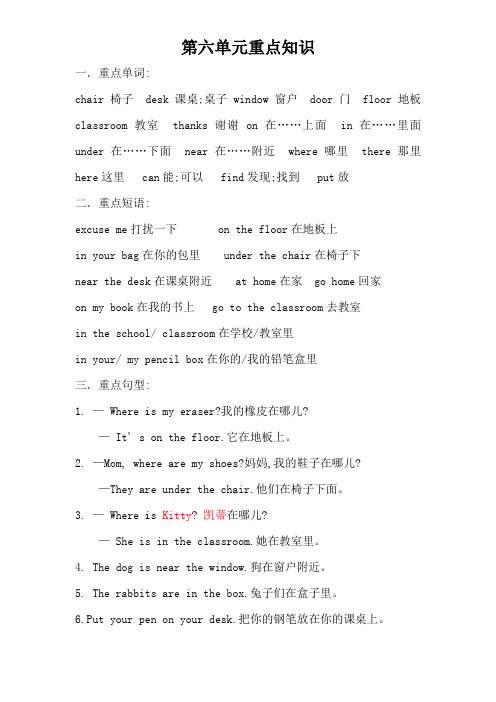
第六单元重点知识
一.重点单词:
chair椅子 desk课桌;桌子 window窗户 door门 floor地板classroom教室 thanks谢谢 on在……上面 in在……里面under在……下面 near在……附近 where哪里 there那里here这里 can能;可以 find发现;找到 put放
二.重点短语:
excuse me打扰一下 on the floor在地板上
in your bag在你的包里 under the chair在椅子下
near the desk在课桌附近 at home在家 go home回家
on my book在我的书上 go to the classroom去教室
in the school/ classroom在学校/教室里
in your/ my pencil box在你的/我的铅笔盒里
三.重点句型:
1. — Where is my eraser?我的橡皮在哪儿?
— It' s on the floor.它在地板上。
2. —Mom, where are my shoes?妈妈,我的鞋子在哪儿?
—They are under the chair.他们在椅子下面。
3. — Where is Kitty? 凯蒂在哪儿?
— She is in the classroom.她在教室里。
4. The dog is near the window.狗在窗户附近。
5. The rabbits are in the box.兔子们在盒子里。
6.Put your pen on your desk.把你的钢笔放在你的课桌上。
- 1、下载文档前请自行甄别文档内容的完整性,平台不提供额外的编辑、内容补充、找答案等附加服务。
- 2、"仅部分预览"的文档,不可在线预览部分如存在完整性等问题,可反馈申请退款(可完整预览的文档不适用该条件!)。
- 3、如文档侵犯您的权益,请联系客服反馈,我们会尽快为您处理(人工客服工作时间:9:00-18:30)。
1-6单元重点单词,短语和句子
Unit 1-2
1.这是什么?What is this?
是橡皮。
It is an eraser.
怎么拼写?How do you spell it?
2.这是你的转笔刀么?Is this your pencil sharpener?
不,不是。
是Mary的。
No, it isn’t. It’s Mary’s.
3.那是你的字典在失物招领处么? Is that your dictionary in the Lost and
Found?
4.请给Alan打4954549 Please call Alan at 4954549.
5.这是你的一串钥匙么?请打685。
Is this set of keys yours? Please call 685.
6.你叫什么名字?我叫Jenny. What’s your name? My name is Jenny.
7.他叫什么名字?他叫Tony。
What’s his name? His name is Tony.
8.她的电话号码是多少?What’s her telephone number?
9.他的姓是什么?他的名儿是什么?
What’s his family name? What’s his first name?
10.你的地图是什么颜色?是蓝绿色的。
What color is your map? It’s blue and green.
Unit 3
1.这是我的父亲。
This is my father.
2.那是我的母亲。
That is my mother.
3.这是我的父母。
These are my parents.
4.那是我的祖父母。
Those are my grandparents.
5.他是我的叔叔。
He is my uncle.
6.她是我的姑姑。
She is my aunt.
7.他们是我的朋友。
They are my friends.
8.她是你的女儿么?是的。
Is that your daughter? Yes, she is.
9.他是你的儿子么?不是。
Is he your son? No, he isn’t.
10.他们是你的孩子们?是的。
Are they your children? Yes, they are.
11.这是你的朋友们么?是的。
Are these your friends? Yes, they are.
12.他们是你的表兄弟么?不是。
Are they your cousins? No, they aren’t.
13.谢谢你的家庭照片。
Thanks for the photo of your family.
14.这是我的家庭照片。
我的父母,祖父母,我的表弟和我在照片上。
This is a photo of my family. My parents, grandparents, cousin and I are in it. Unit 4
1.梳妆台dresser
2.书柜bookcase
3.抽屉drawer
4.植物plant
5.了解,知道know
6.闹钟alarm clock
7.录像带video tape
8.拿走take
9.带来bring
10.东西,物thing
11.需要need
12.地板floor
句子
1.我的棒球在哪里?它在书包里。
Where is my baseball? It’s in the backpack.
2.我的电脑游戏在哪里?在床底下。
Where is my computer game? It’s under the bed.
3.他的钥匙在哪里?在梳妆台上。
Where is his key? It’s on the dresser.
4.你的植物在哪里?在门旁边。
Where is your plant? It’s beside the door.
5.我的书在哪里?Where is my book?
我不知道。
I don’t know.
在书柜里么?Is it on the bookcase?
没有。
No, it isn’t.
6.我的的铅笔盒在哪里?在沙发上么?
Where is my pencil case? Is it on the sofa?
没有。
在你的抽屉里。
No, it isn’t. It’s in your drawer.
7.我的书在哪里?Where is my book?
在电脑旁边。
It’s beside the computer.
那我的钥匙呢?Where are my keys?
在梳妆台上。
They are on the dresser.
8.今天下午我上课需要一些东西。
I need some stuff for class this afternoon.
9.你能给我带过来么?Can you bring them to me?
10.我需要手表,笔记本和身份证。
I need a watch, a notebook and an ID card.
11.请把这些东西带给你的妹妹。
Please take these things to your sister.
12.我12点钟跟你碰面。
I’ll meet you at twelve o’clock.
Unit 5
1大量的; many
2有趣的; fun
3有趣的,令人愉快的;interesting
4放松的; relaxing
5困难的;difficult
6更多的; more
7容易的; easy
8无聊的; boring
9俱乐部;club
10收藏品;collection
11打篮球; play basketball
12打排球,play volleyball
13踢足球,play football
14乒乓球,play ping-pong
15网球拍,tennis racket
16乒乓球拍,ping-pong bat
17看电视,watch TV
18玩电脑游戏,play computer games
19每天,every day
20 做运动play sports
21足球soccer ball
Sentences:
1我想打网球。
你有网球拍么?I want to play tennis. Do you have a racket? 2我没有。
但是我弟弟有。
No, I don’t. But my brother does.
3你有足球么?Do you have a soccer ball?
4是的,我有。
Yes, I do.
5让我们踢足球吧。
Let’s play football.
6听起来很好。
That sounds good.
7他收藏很多体育用品。
He has a great sports collection.
8她每天做运动。
She plays sports every day.
9他只在电视上看棒球比赛。
He only watches baseball matches on TV.
Unit 6 听写
1大量的lots of
2 健康食品healthy food
3 冰激凌ice cream
4 署条French fries
5 跑步明星running star
6你喜欢汉堡么?是的,我喜欢。
Do you like hamburgers? Yes, I do.
7 他们喜欢吃蔬菜么?不,他们不喜欢。
Do they like eating vegetables?
No, they don’t.
8他喜欢吃菜花么?不,他不喜欢。
他喜欢吃西红柿。
Does he like eating broccoli?
No, he doesn’t. He likes eating tomatoes.
9她喜欢吃胡萝卜。
我们给她买点胡萝卜吧。
She like eating carrots. Let’s buy some carrots for her.
10 早饭,我妈妈吃鸡蛋,橙子和草莓。
For breakfast, my mother has eggs, oranges and strawberries.
11 甜点,我喜欢蛋糕和水果沙拉。
For dessert, I like cakes and fruit salad.
12 她是跑步运动员。
她不能吃不健康的食品。
She is a runner. She can’t eat unhealthy food.。
